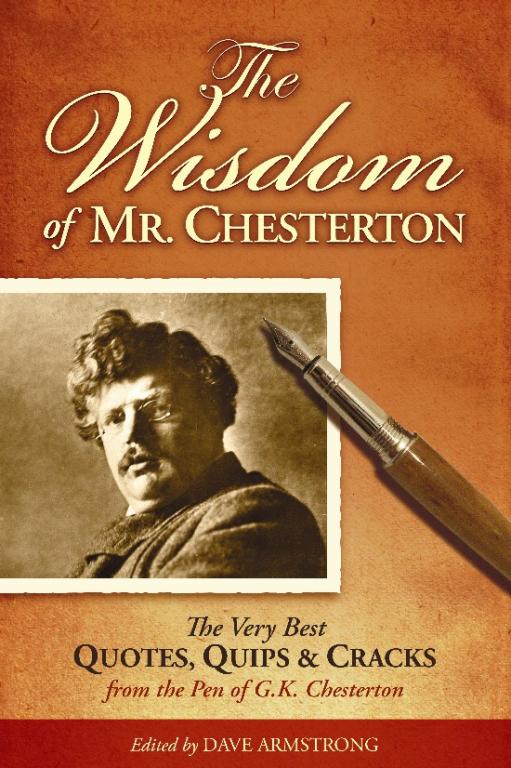[see the information page for this book, for full details and all purchase options; available for as low as $1.99 and $2.99 as an e-book]
(completed on 10 October 2008; published in December 2009 by Saint Benedict Press, 378 pages)
* * * * *
This seems to be my “forgotten” quotations book. Yet it was glowingly reviewed by Chesterton expert Dale Ahlquist in his Gilbert Magazine and is in the catalogue for the American Chesterton Society. For some reason it never seems to have moved up very far in the Amazon charts.
Oh well: some things in the book world are a mystery, and seem unfair and odd. But I think this is a good book, if I do say so (I certainly greatly enjoyed collecting the quotations), and hope some of you Chesterton lovers out there will purchase it. If you love Chesterton, you’ll love this.
Three of my quotations books have been “officially” published; this one, The Quotable Newman (Sophia Institute Press,2012), and The Quotable Wesley (Beacon Hill Press: a major Wesleyan [Protestant] publisher, 2014). I have put out many more quotations books on my own (see a list of all my books). I love to share the thoughts of these great writers (whom I admire so much) with others.
These sorts of books may not sell many copies, but it doesn’t follow that they are not worth putting together. Making tons of money has never been the biggest goal in what I do: not even close. I’m here to share the Catholic and general Christian message. God has provided my family’s needs.
Excerpts from the Introduction
An aphorism is a terse, pithy, astute, proverb-like saying that comments on some general truth; a maxim; an adage. G. K. Chesterton was an absolute master of the form: one of the very best in the English language. His common sense, whimsy and wit, essential optimism, characteristic joviality, and deep Catholic faith further enrich his already wise aphorisms.
Chesterton also saw many proverbs and old sayings as containing a truth which the people who constantly repeated them had forgotten. The world was asleep and must be awakened. The world had gone placidly mad and must be violently restored to sanity. That the methods he used annoyed some is undeniable, but he did force people to think, even if they raged at him as the unaccustomed muscles came into play.
Back Cover text (from my initial Lulu version)
“No Catholic thinks he is a good Catholic; or he would by that thought become a bad Catholic.”
“The very notion of always talking in terms of tomorrow is a passing taste that will soon be a thing of yesterday.”
“Perspective is really the comic element in everything.”
G. K. Chesterton (1874-1936), widely considered the greatest Christian apologist of the first third of the twentieth century and champion of the “common man,” was a master of the aphorism: pithy, astute, proverb-like sayings or maxims that comment on general truths of life.
This 300-page collection consists of more than 2100 Chesterton quotations: all single sentences, drawn from 34 of his non-fiction books and 229 articles written for The Illustrated London News.
They have been painstakingly selected and organized under 281 topics, with extensive cross-referencing underneath, directing readers to many related topics. The aphorisms under each category are presented in the order they appear in Chesterton’s works, and chronologically from one work to the next. Access is made easier by handy indices of topics and citations categorized by primary sources.
The citations presented herein cover the whole gamut of human experience and thought: from religion and morality (as we would expect of an unapologetic apologist), to the romance and wonder of childhood, the arts, literature, science, philosophy, economic and social observations, agnosticism, education, history, the follies and foibles of the intelligentsia, the wealthy, and politicians, incessant media bias, everyday life, the family, and gender differences: all offered with astounding insight, playful wit, and a sort of childlike innocence that Chesterton seemed to have never lost.
If one wishes to discover and explore the deep wellsprings of the distinctive Christian worldview, there are few better places to start than the voluminous writings of G. K. Chesterton.














